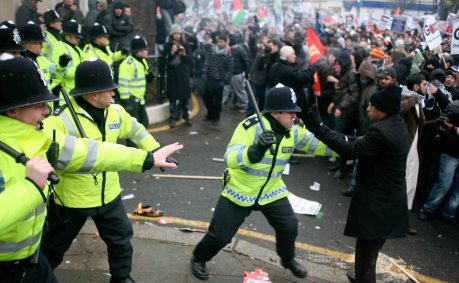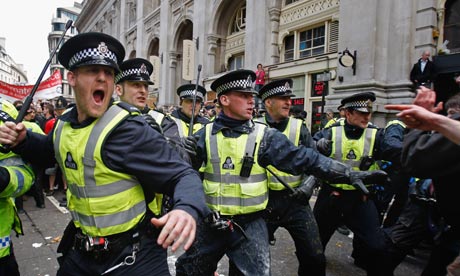All London Anarchist Revolutionary Movement
May 17, 2011

At 3pm on Sunday 15th May the All London Anarchist Revolutionary Movement (ALARM) was born amidst beery cheers in a crowded function room above the Calthorpe Arms pub. The diverse group of eighty or so Anarchist and Libertarian Socialists (including myself and the sound asleep 1.5 yr old Finn) spent the next two hours debating organisational and constitutional issues in an atmosphere more redolent of the W.I. than a revolutionary group. Representatives of London boroughs were nominated and selected, informal communication networks built and, due to the exertions of such a prolonged labour, the debate on the thorny issue of a political manifesto was postponed until next Sunday (at the Cock Tavern, Euston).
ALARM is an opportunity to focus the resurgence of interest in Anarchism that has surfaced here over the last six months. It should provide a cohesive and active confrontational force in opposition to the ongoing Tory austerity programme and the corporatist state. It should become a platform for collective action that goes beyond just ‘fucking things up’ but provide real-word examples of practical anarchism in housing, education, work, healthcare etc.
Coming soon: ALARM website, blog and contact information
An Activists Guide to Police Tactics
March 3, 2011
“The people whose jobs were destroyed were in no way responsible for the excesses of the financial sector and the crisis that followed…I’m surprised the real anger hasn’t been greater than it has.”
The Governor of the Bank of England, Mervyn King March 1st 2011
“Students, activists, agitators, stoners, scratters, scrotes. You will be hit with sticks and sent home to mummy. The rule of law will prevail, order will be restored, Winston will not be shamed, my ancestors will not have died to have allowed you to bring shame on England. You will get up early, get out of your bed, seek work and contribute to the greater good.”
Post on Inspector Gadget Police blog December 2010
“Following the student protests in London on 10 November 2010, where greater numbers gathered than had been anticipated by police, and the incursion of the Conservative Party headquarters in Millbank, the Metropolitan Police Commissioner Sir Paul Stephenson stated that ‘the game has changed’3. The character of protest is evolving in terms of: the numbers involved; spread across the country; associated sporadic violence; disruption caused; short notice or no-notice events, and swift changes in protest tactics. After a few, relatively quiet years, this is a new period of public order policing – one which is faster moving and more unpredictable. Foreseeing the character of events will prove more difficult and, in some cases, their nature and mood will only become apparent on the day.”
HMIC feb 2011 Adapting to Protest and Nurturing the British Model of Policing
Public Order tactics used by the British Police have their origin in colonial rule. From that starting point they were refined through the experience of Northern Ireland and the riots of the 1980’s to form today’s set of Quasi-military tactics where lines of police attempt to control, contain or disperse crowds of protesters. The rise of a spontaneous, decentralised protest movement and increased anger directed at the police set against a deepening economic crisis has led to calls for a tougher approach to public ‘disorder’. The demonstration against the coalition governments economic policy on March 26th will be the biggest showdown London has seen since the poll tax riot of 1989 and will be a defining moment in how the state polices mass dissent. The following is a user’s guide to understanding police tactics and capabilities culled mostly from police sources, specifically “ACPO Manual of Guidance on KEEPING THE PEACE” 2010 as well as various police blogs and forums:
“Summer of rage” round one: G20 Meltdown
March 3, 2009

“Anyone who was working in the City in 1999 will remember how awful those riots were. There were riot police banked outside my office and all the tube stations closed so I had to walk for miles through what was effectively a war zone. It was absolutely terrifying and I’m afraid I can’t believe there is anything more behind it than a desire to cause as much damage and mayhem as possible. The mindset is no better than that of football hooligans, if not worse. I for one will be taking April 1st as a day’s holiday rather than risk putting myself through anything like that again.”
London Evening Standard march 2009
